
With Paid Search Queries Gone From Analytics, What Should Advertisers Do Now?
Now that Google Analytics has lost Paid Search Queries, what’s this mean for advertisers? Is this a sign of the apocalypse, or are we all just stressing out over nothing?
First, a little insight:
In an effort to improve security for Chrome users, Google rolled out SSL encryption for omnibox searches (in Chrome) when users aren’t signed into Google. This is a change from previous incarnations, where the security layer was only applied to users who were signed in. But Google isn’t the only one to have added this layer of encryption. Firefox 14+, Mobile Safari and even IE (10) have joined the game.
This added SSL encryption to users who aren’t signed in means that these browsers won’t pass query information to Analytics (or other tracking tools) on a wider scale. This realization, of course, did not sit well with advertisers, who rely on Search Term reporting. So, is this the end of search data as we know it?
Far from it.
You Can Still See Search Queries In AdWords!
This change in browsers will not affect your ability to pull Search Term reports from within AdWords. This report, of course, is a huge benefit for when you expand your keyword library and block undesired traffic. And you’ll still be able to monitor organic trends from Webmaster Tools, as per usual, if connected to Google Analytics.

But here’s where you might see a change …
Let’s say you need search query information added to your URL. With this change, you’ll now need to use ValueTrack (and may need to use it for dynamic landing pages as well).
So Why The Heck Is SSL Messing Things Up For Me?
SSL stands for secure sockets layer and protects vital information as its transmitted over the Internet. It’s a vital component of protecting data from hackers and identity thieves, and you can expect it not to go anywhere anytime soon. It makes perfect sense that web browsers like Chrome add security measures to all of its users.
Did Google Have Any Ulterior Motives For Making This Change?
Perhaps it’d be best to ask yourself if Google ever doesn’t have an ulterior motive. This change is certainly a benefit to the users at large; however, it can benefit Google as well. Here’s why:
3rd party ad networks (many of which you may use) use Google search behavior data to target ads to a specific audience. Since Google has its own display network, it’s in direct competition with these networks. This recent change can help Google increase the likelihood of a user buying directly from them before resorting to a third-party ad network.
Do You Need Help With ValueTrack Or With Adapting To Any Of The Many Changes Google Rolls Out Regularly?
Being an online advertiser certainly can be confusing. Keeping up with all the changes, while doing all that you can to ensure you’re optimizing your strategies is more than just a full-time job. It takes a deep level of expertise and commitment, both of which OperationROI offers. Learn how we can help you with your marketing strategies by calling us at 1-888-277-5429 or filling out our contact form.






